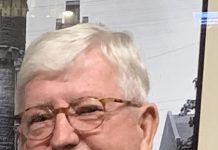Commentary: ‘Care For Him Who Shall Have Borne The Battle And For His Widow And His Orphan’
By John Krull
TheStatehouseFile.com
INDIANAPOLIS—Some wounds don’t heal.
A few years ago, on a trip to Washington, D.C., I visited the Vietnam War Memorial. I had been there before.
To Americans of my generation, that war was a seminal part of our growing up. The perception in hindsight is that it was the war Americans experienced in their living rooms, brought to them by television.
Many—perhaps most—of us felt its impact closer to home. There were older kids in my working-class childhood neighborhood who went away to fight. Some never came home.
Once, on an earlier trip to the memorial, I looked for the name of a camp counselor I had hero-worshipped when I was 8. He got called up near the end of our time at camp. The other counselors gathered round him. Each one of them hugged him. Tears flowed.
To this day, I remember him putting his hand on my shoulder as he said goodbye and telling me it had been good knowing me.
For years afterward, I wondered whether he made it home. When I looked on the wall, I realized I wouldn’t be able to figure out if his name appeared on it. At the camp, the counselors went only by their first names—and his was a common one.
On this later trip to the wall, I happened to stand close to two women. They were slightly older than I was.
They stopped. They found the name they were looking for. They reached out to touch the lettering.
Then they began to cry, silent tears moving down their cheeks in little streams.
The man whose name was etched in the stone had been gone for more than 40 years, but for those two women the grief—the hurt—was still there. Time had not healed it.
As I stood near them, I wondered who the dead soldier was to them. A brother? A husband? A cousin? A friend? A lover?
In the end, I decided that what he had been to them mattered less than the fact that he was gone.
And that these two women were left only with memories and a name carved on a wall—a wall with way too many names.
I think of that moment and those two women often.
Particularly on Memorial Day.
It is the holiday in which we are supposed to remember those who died in defense of this nation. It is fitting and proper that we do so.
Sometimes, though, we forget that it wasn’t just those who gave their lives to protect us who made sacrifices.
Others did, too.
Those two women, for example—who left pieces of their hearts and their lives in Southeast Asia decades ago. They lost someone they loved. Their lives were forever altered—even diminished—by that loss.
Eight score and six years ago, near the end of another one of America’s horrific conflicts, our greatest president said:
“With malice toward none, with charity for all, with firmness in the right as God gives us to see the right, let us strive on to finish the work we are in, to bind up the nation’s wounds, to care for him who shall have borne the battle and for his widow and his orphan, to do all which may achieve and cherish a just and lasting peace among ourselves and with all nations.â€
Those were wise words when Abraham Lincoln uttered them in 1865.
They are wise words still.
They remind us that tragedies that are heroic still are tragedies.
All our wars have many memorials.
Some of those memorials are walls with names carved into stone.
Even more are the tears that stream down cheeks and the grief that takes up residence in the hearts of those who lost loved ones—grief that never leaves.
Because some wounds don’t heal.
FOOTNOTE: John Krull is director of Franklin College’s Pulliam School of Journalism and publisher of TheStatehouseFile.com, a news website powered by Franklin College journalism students.









It’s not often I agree with this liberal, but this time I do. Well done, sir.
Comments are closed.